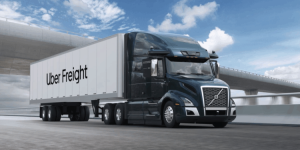Joy Agwunobi
Uber Freight has unveiled what it describes as the logistics industry’s first fully scaled artificial intelligence (AI) logistics network, an innovation powered by its proprietary large language model (LLM) designed specifically for logistics.
This AI infrastructure has been seamlessly embedded into Uber Freight’s transportation management system (TMS) and logistics platform, marking a significant evolution in how shippers manage supply chain operations.
According to the company, this development represents a fundamental reimagining of transportation logistics placing AI at the core to drive smarter decision-making, faster execution, and improved operational performance across supply chain networks of all sizes.
Looking ahead, the company stated that by the end of 2025, it plans to fully enhance its TMS by deeply integrating Insights AI and a comprehensive agent ecosystem. This move will transform the TMS from a traditional system of record into a dynamic, real-time logistics command center. The upgraded system will proactively guide users ranging from small businesses to large enterprises—through intelligent insights and by automating routine, repetitive tasks.
The platform now includes more than 30 AI agents, each designed to automate key operational processes across the entire shipment lifecycle. These agents are responsible for tasks such as procurement, execution, tracking, payment processing, and performance analytics.
Simultaneously, the integrated Insights AI tool continuously delivers real-time, actionable recommendations, helping shippers navigate disruptions, lower costs, and improve service delivery.
Uber Freight reports that its AI logistics framework has already facilitated the movement of over $1.6 billion in freight over the past year. Five enterprise brands participated in early testing and validation of the technology. The proprietary LLM powering this ecosystem is trained on operational data from nearly $20 billion worth of freight under management—encompassing 30 per cent of the Fortune 500—which enables it to provide highly contextualised and practical logistics recommendations.
One of the key participants in this transformation is Colgate-Palmolive, which joined as a flagship partner in Uber Freight’s Design Partners Program. Over the past year, the global consumer goods leader has worked closely with Uber Freight’s transportation management teams to deploy Insights AI. This collaboration has led to significant gains in logistics intelligence, agility, and strategic decision-making.
By incorporating Insights AI into daily operations, Colgate-Palmolive’s logistics team now receives timely, data-backed recommendations that drive cost efficiency, mitigate disruptions, and streamline global supply chain decision-making. This, according to the company, underscores the potential of AI to deliver tangible value in complex logistics environments.
Lior Ron, founder and CEO of Uber Freight, emphasised the strategic significance of this launch, stating, “This is the inflection point we have been building toward. With the launch of our AI logistics network and reimagined TMS, we are not just automating tasks—we are enabling a new level of agility, foresight, and competitive advantage for our customers.”
Similarly, Raj Subbiah, chief product officer at Uber Freight, highlighted the importance of domain expertise in AI deployment:
“Logistics is one of the most complex, data-rich industries on Earth, and it demands AI that’s purpose-built to understand it. We built a domain-specific model that thinks like a logistics expert. That foundation enables us to proactively and continuously optimise our customers’ networks.”
Tatiana Martinez, vice president of North America Customer Service & Logistics at Colgate-Palmolive, added, “With the scale and complexity of our operations, the collaboration with Uber Freight on Insights AI has helped empower our team to access timely information, analyse our network, and make strategic decisions that drive faster growth. Insights AI has helped us plan with greater confidence and respond more effectively to disruptions, all in service of our ongoing commitment to customer centricity and operational efficiency.”
With this landmark advancement, Uber Freight is positioning itself at the forefront of AI-driven supply chain transformation. By integrating logistics-specific artificial intelligence deeply into operational workflows, the company aims to elevate the logistics industry from reactive management to proactive orchestration—empowering businesses to anticipate change, respond with precision, and continuously optimise their networks in an increasingly complex global environment.









